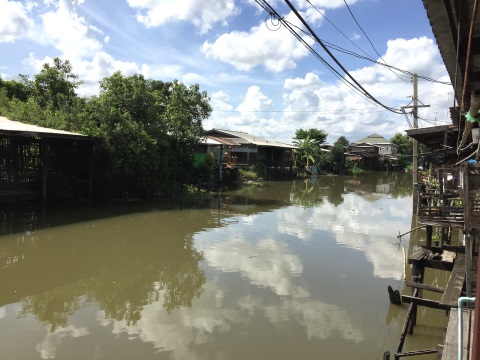| Back to Back Issues Page |
 |
|
Bangkok Travelbug Oct 2017 A drive through rural Bang Len October 09, 2017 |
| Hello
Rangkratoom Market The Rangkratoom Market is a very old market, more than 100 years old. Situated where two canals cross each other, at a time when canals were the main thoroughfare in Thailand and boats were the main form of transport, it became a thriving trading centre. With the development of highways and motor vehicles, boats and canals became tourist attractions though in some rural areas people still preserved the practice of using boats. Some of these old markets were lucky enough to be along a main road. This brought the customers who were mostly local visitors. Others tried to reinvent themselves with new attractions like bringing boat vendors to attract customers. We arrived at Rangkratoom after a long drive with lots of turns. At the end of the road, there’s a park and clock tower in Chinese design, an indication of the ethnic origins of the residents here. There’s also Chinese shrine dedicated to the deity who is the Guardian of Heaven and Earth. 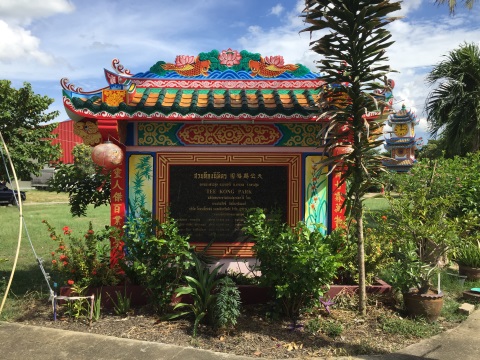
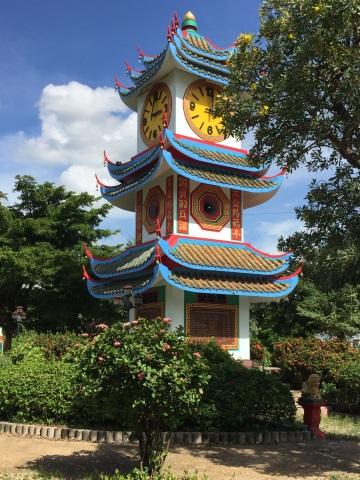
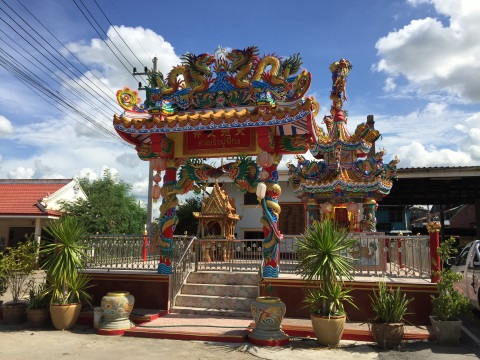
The park (top), clock tower (centre) and shrine (bottom) We stopped to ask for the way and were directed down an alley with a few shops. We walked till we reached a T junction. Straight ahead an arched wooden bridge spanned the canal to the community living on the other side. 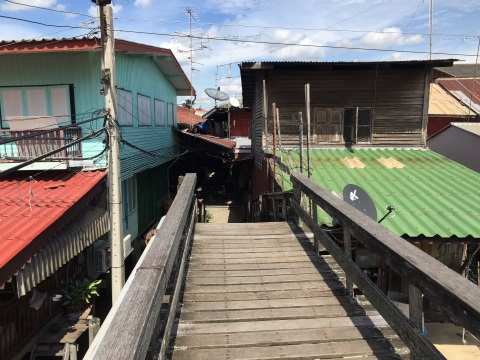
Community living across the canal from the market The canal was peaceful with no boat traffic or vendors. A lone fisherman was raising his net to check on the catch. 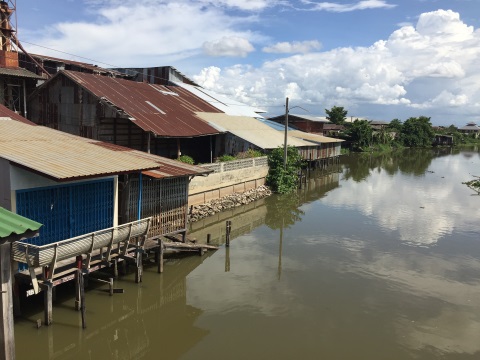
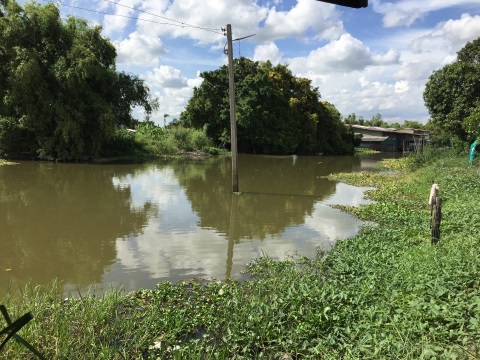
Quiet along the canal 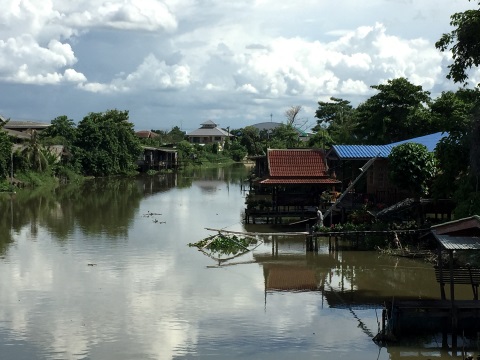
Lone fisherman The alley to the right led to the Rangkratoom Market. There were some shops initially, beyond which we stared down an empty alley! 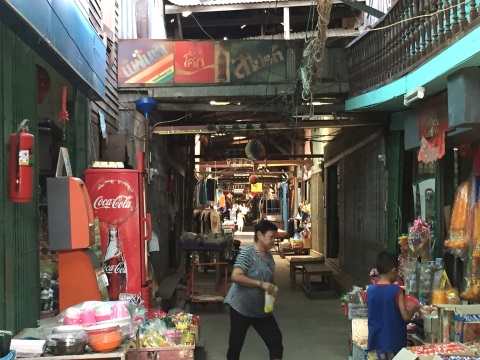
Shops 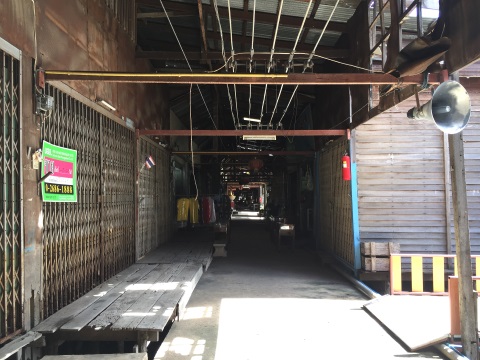
Empty alley We walked down the empty alley, there were only two other visitors taking photos of the canal scenes. Many of the shops were locked, I looked through some of the metal sliding gates. The shops were empty, didn’t looked as if anybody lived there anymore. 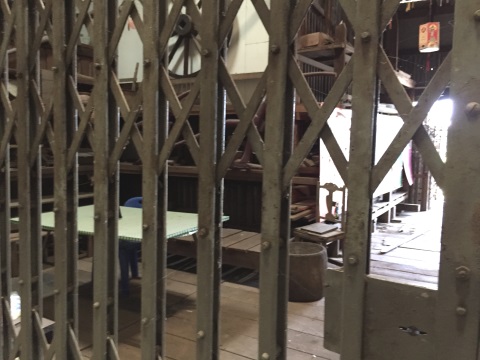
One of the many locked shops Further down the alley, we found a shop selling fishing nets and cages. 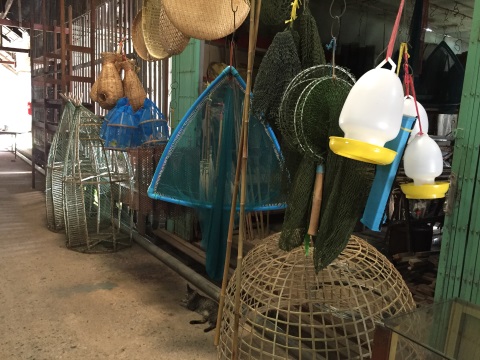
Fishing shop This is the first time, I’ve come across an old market that was so bare and deserted. Another resident we met along the way said that the boom days are gone, customers stopped coming and the shops closed. 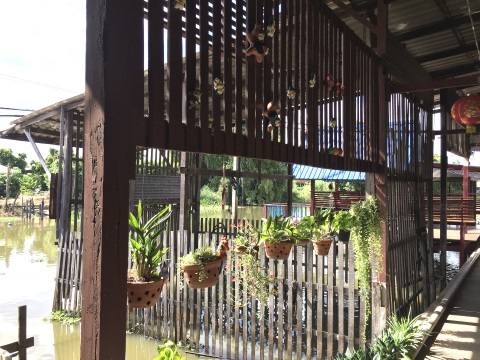
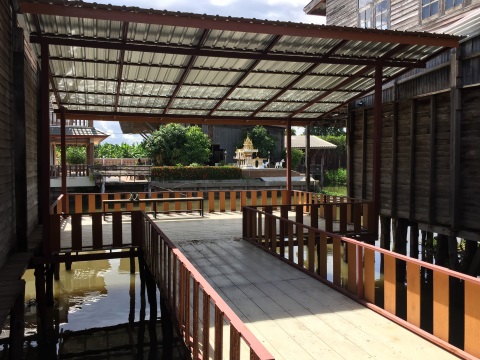
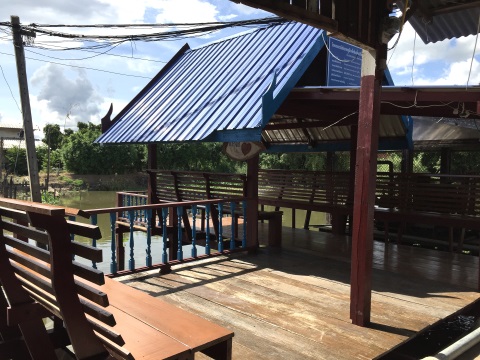
Empty areas and seats We emerged from the alley onto the main street leading back to where we started, there were no cars, no visitors. 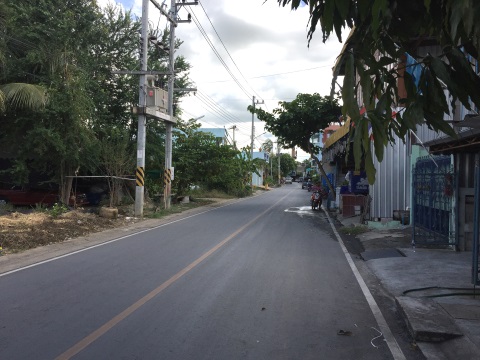
Empty main street Back at the Chinese shrine, the couple who are caretakers of the shrine gave us some information on the market and its current state. The Rangkratoom Market unfortunately is completely off the beaten track, located at the dead end of a maze of country roads. No main roads passed through the market. Visitors found it after getting lost or stumbled upon it by chance. They had similar problems trying to find their way out. We can attest to that, it happened to us too. Another reason is that the current generation didn’t wish to continue with their forefathers’ livelihood of being shop keepers and they moved to the cities to seek different careers. Less shops meant less customers and less business, remaining shop owners packed up and left and the market just withered away. It used to be a popular market in the past, with lots of goods and Chinese delicacies. People thronged the narrow alley. Today, the alley is empty, so are the dining areas. It’s sad to see what used to be a thriving market community just shut down like this. Contents Country roads After finding our way there, we tried to go out by another way to view the country scenery and try to locate our next stop, the Saint Andrew Church. However, the direct route to the church from where we were, is passable only to pedestrians and motor cycles. After asking the way several times we still couldn’t find an alternative route to the church and we decided to get out to the main road. It was a pleasant drive though; green rice fields all around for as far as the eye can see, clean, fresh country air. 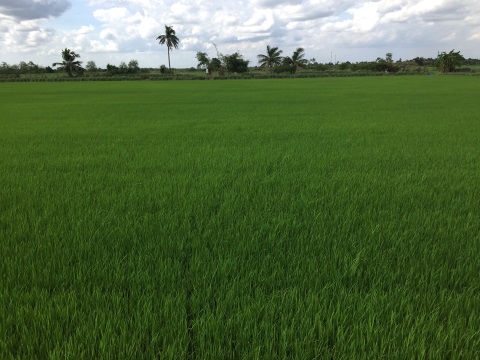
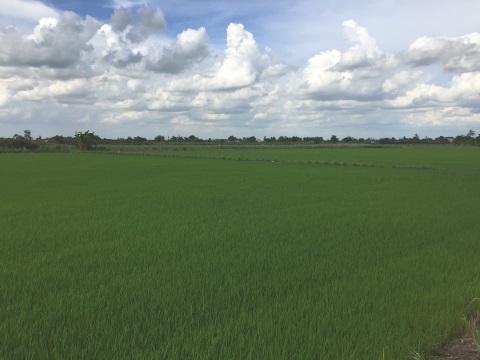
Green rice fields along the way We passed this grand building, which is the Rangkratoon township administrative block. It was a surprise to see a modern building in the midst of all these rice fields. 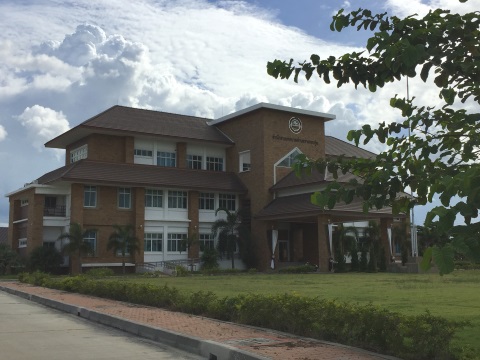
Tambon Rangkratoom Municipal Office Once on the main highway, we saw the steeple of a church in the distance. After a couple of U-turns, we went back in again by another road. Contents St Andrew Church It’s rare to come across a church in rural Thailand. Most of the churches I’ve come across are in the main towns and cities. That’s why I was drawn to the Saint Andrew Church when I saw it on the map. Saint Andrew Church is a relatively new church officially opened on 4 December 1999. The Saint Andrew School is co-located with the church. It was a cloudy Saturday afternoon and there was nobody else present at the church. 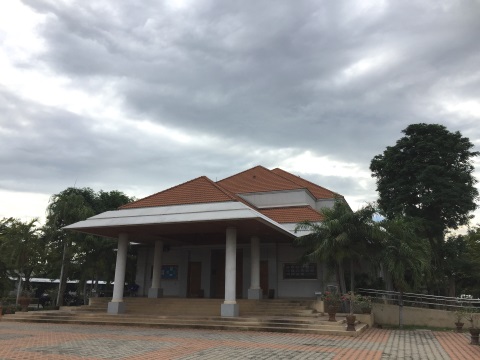
The church under gloomy skies 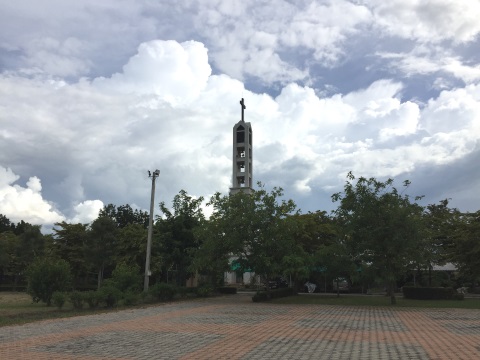
The belfry It was this statue of Saint Andrew in the grounds of the church that caught my eye. I didn’t know much about Saint Andrew even though my family and friends were associated with institutions named after him. Now I found out. 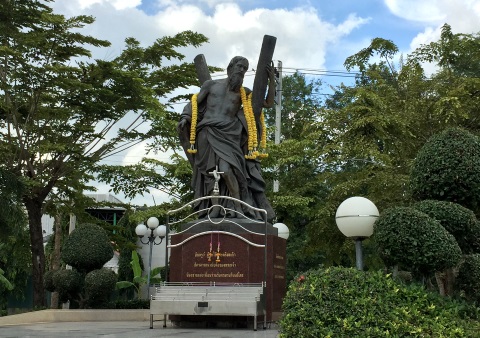
Statue of Saint Andrew taken earlier in the visit when the skies were clear Andrew and his brother of Simon Peter were two of the 12 apostles of Christ. The two brothers were fishermen on the Sea of Galilee. One day while they were out on a boat fishing, Christ walked along the shore of Galilee and called out to them, "Follow Me, and I will make you fishers of men." They left their nets at once and went with him. (Mathew 4:18-20) Andrew was mentioned again in the New Testament during the annual Passover celebration when a large crowd followed Jesus up the hills. When it was time to feed the people, Jesus turned to his apostles for food. It was Andrew who pointed out that there was a boy with five barley loaves and a couple of fish. With these meagre rations, the people were fed and another miracle was performed. (John 6:8-9) After the death and resurrection of Christ, the apostles went their separate ways to preach the gospel. Andrew was in Patras, Greece when he was arrested by the Romans and sentenced to be crucified. He felt he was unworthy to be crucified on a cross similar to that on which Christ was crucified. Instead he asked to be crucified on an X-shaped cross. On 30 November 60 AD, he was bound rather than nailed to this cross which subsequently became known as the Saltire or St Andrew’s Cross. According to legend, in 347 AD the monk St Rule had a vision to move some of Andrew’s remains from Patras to "the ends of the earth". His journey took him to Fife on the east coast of Scotland to what is today the coastal town of St Andrews, famous for its golf courses. In 832 AD the Saltire or St Andrew’s Cross was adopted as the national emblem and flag of Scotland, a white cross against a blue background. In 1320 St Andrew was declared patron saint of Scotland. He is also patron saint of several countries and cities; Barbados, Romania, Russia, Ukraine, Amalfi in Italy, Esgueira in Portugal, Luqa in Malta, Parañaque in the Philippines and Patras in Greece. Saint Andrew and his brother Saint Peter are the patron saints of fishermen. Relics of Saint Andrew are preserved in Amalfi Cathedral in Amalfi, Italy, Saint Mary’s Cathedral in Edinburgh, Scotland and Church of St Andrew in Patras, Greece. Both the Catholic and Orthodox Churches observe the Feast of St Andrew on 30 November which is also National Day of Scotland. Why this interest in Saint Andrew? Some of my best friends in Singapore attended Saint Andrew’s School, my late parents were married in Saint Andrew’s Cathedral and attended services there till the end of their days. 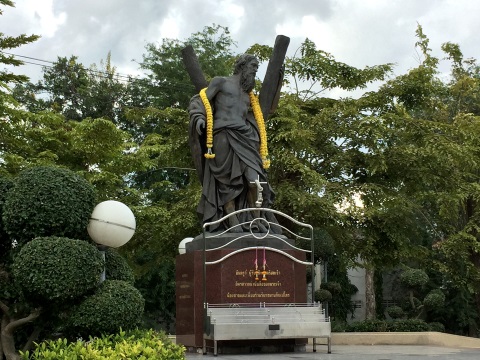
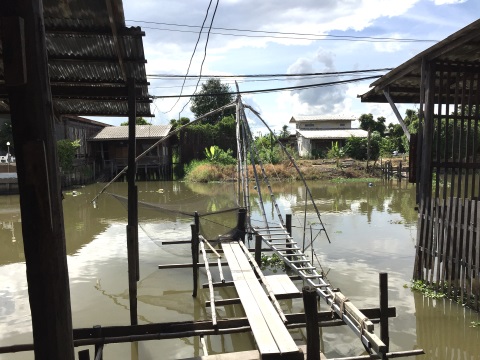
"Follow Me, and I will make you fishers of men" Contents Map of the drive through rural Bang Len If the map doesn’t appear, click on this link How to get there By car Taksin Bridge - Ratchaphruek Road – Highway 338 – Highway 9 – Highway 340 (Bang Bua Thong – Suphanburi Road) – Highway 346 Please refer to coloured markers on the map. Address Rangkratoom Market 46, Mu 5 Bang Phasi Bang Len Nakhon Pathom 73130 St Andrew Church 1, Mu 3 Tambon Bang Phasi Amphur Bang Len Nakhon Pathom 73130 Tel: +66 34 962 228 Contents Next month Pridi Banomyong Memorial House, Ayutthaya If you enjoyed reading this e-zine, please forward it to a friend. If you received this from a friend and found it interesting, please subscribe at Bangkok Travelbug. What do you think of the Bangkok Travelbug? We love to hear from you What other subscribers have said Till next month then. Eric Lim Tour Bangkok Legacies Find us on Facebook If you are an independent traveller, here's a handy e-guide book, Tour Bangkok Legacies, which will help you along as you explore the streets of Bangkok and discover its old treasures. It's complete with historical descriptions, maps and detailed directions on how to get to these places. My Kindle e-book 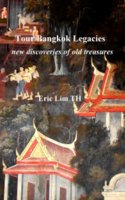
Copyright@2008-2017 Tour Bangkok Legacies All rights reserved
|
| Back to Back Issues Page |
